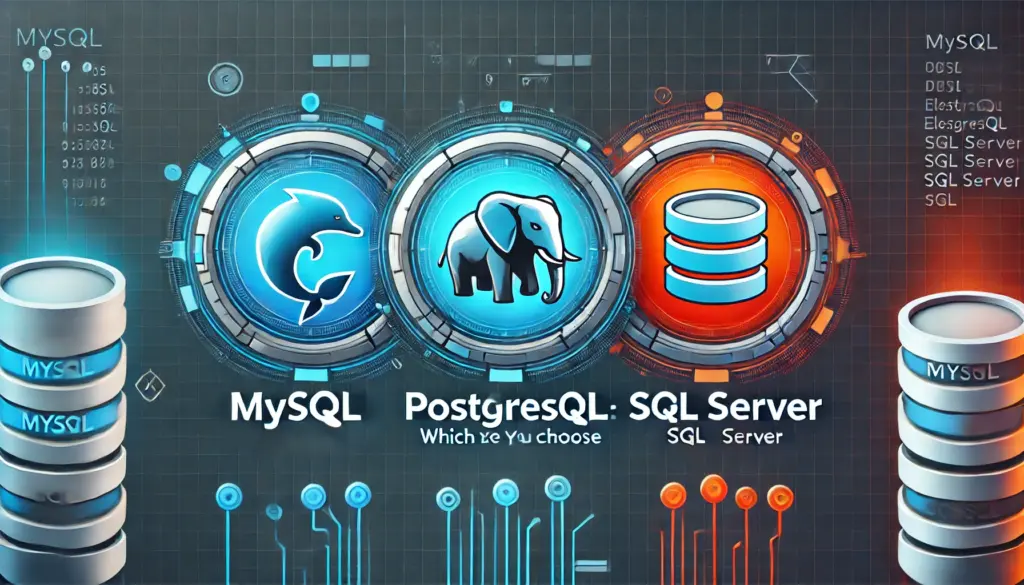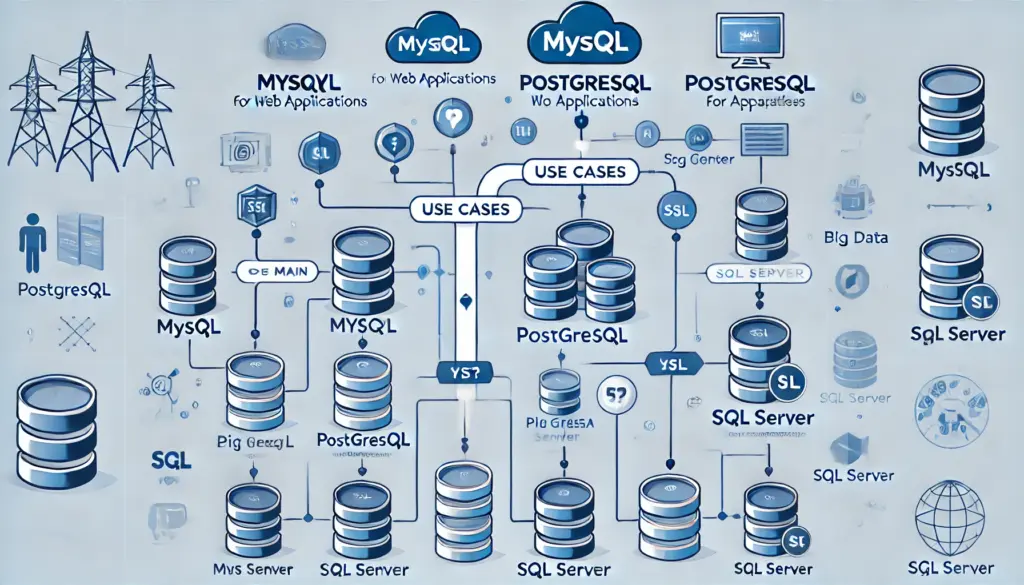📖 MySQL vs PostgreSQL vs SQL Server: Which One Should You Choose?
MySQL vs PostgreSQL vs SQL Server: Choosing the right database management system (DBMS) is crucial for developers, businesses, and data analysts. MySQL, PostgreSQL, and SQL Server are among the most popular choices, but which one is best for your needs?
In this guide, you’ll learn:
✅ Key differences between MySQL, PostgreSQL, and SQL Server
✅ Strengths, weaknesses, and best use cases for each
✅ Performance, security, and scalability comparisons
By the end, you’ll have a clear idea of which database is right for your project! 🚀

📌 1. Quick Comparison: MySQL vs PostgreSQL vs SQL Server
| Feature | MySQL | PostgreSQL | SQL Server |
|---|---|---|---|
| Type | Relational DBMS | Object-Relational DBMS | Relational DBMS |
| Performance | Fast for read-heavy workloads | Best for complex queries & analytics | Optimized for enterprise applications |
| ACID Compliance | Yes, but some storage engines lack full support | Fully ACID-compliant | Fully ACID-compliant |
| Use Cases | Web apps, CMS, eCommerce | Data analytics, financial systems | Enterprise apps, Microsoft ecosystems |
| Open Source? | Yes (owned by Oracle) | Yes (fully open-source) | No (proprietary by Microsoft) |
📌 2. MySQL: Fast & Easy to Use
✅ Best for: Web applications, startups, and lightweight database needs.
MySQL is one of the most widely used databases, especially for web applications like WordPress, Shopify, and Facebook.
Pros of MySQL:
✔️ Easy to set up & use – Beginner-friendly
✔️ Fast for simple queries – Great for read-heavy applications
✔️ Wide community support – Many free resources
Cons of MySQL:
❌ Limited support for complex queries – Not ideal for data analytics
❌ ACID compliance varies – Some storage engines lack full support
Example Use Case:
If you’re building a blog, eCommerce store, or CMS, MySQL is an excellent choice.
🖼️ Image Placeholder: MySQL database icon with a web application illustration.
📌 Alt Tag: “MySQL database usage example for web applications.”
📌 3. PostgreSQL: The Powerhouse for Data Analytics
✅ Best for: Data analysis, financial systems, and applications needing complex queries.
PostgreSQL is known for its advanced SQL features and robust data integrity. It’s widely used in finance, scientific research, and large-scale analytics.
Pros of PostgreSQL:
✔️ Full ACID compliance – Ensures strong data integrity
✔️ Advanced query support – Supports complex joins, indexing, and JSON
✔️ Great for analytics – Used in AI, finance, and geospatial data
Cons of PostgreSQL:
❌ Slightly slower for simple queries – Not as fast as MySQL for basic operations
❌ Steeper learning curve – More advanced features require expertise
Example Use Case:
If you’re handling big data, financial transactions, or analytics, PostgreSQL is a top choice.
📌 4. SQL Server: Enterprise-Grade Database for Large Businesses
✅ Best for: Enterprise applications, Microsoft ecosystems, and high-security needs.
SQL Server is a proprietary database by Microsoft, often used in corporate environments, banking systems, and government applications.
Pros of SQL Server:
✔️ Optimized for Windows & .NET applications – Works seamlessly with Microsoft tools
✔️ Advanced security features – Encryption, auditing, and compliance
✔️ Excellent performance for large businesses
Cons of SQL Server:
❌ Not free (except Express edition) – Licensing costs can be high
❌ Primarily Windows-focused – Less flexibility for Linux environments
Example Use Case:
If your company relies on Microsoft tools (Azure, .NET, Power BI), SQL Server is the best fit.
📌 5. Which Database Should You Choose?
| Use Case | Best Database |
|---|---|
| Building a blog or eCommerce website | 🏆 MySQL |
| Handling financial transactions & big data | 🏆 PostgreSQL |
| Working with Microsoft-based applications | 🏆 SQL Server |
💡 Pro Tip: If you’re starting with simple web applications, go with MySQL. If you’re dealing with analytics, choose PostgreSQL. If you’re in an enterprise setting, SQL Server is the way to go.

📌 Final Thoughts: Pick the Right Database for Your Needs
✔ MySQL = Best for web apps, simple databases, and fast performance.
✔ PostgreSQL = Best for analytics, data-heavy applications, and complex queries.
✔ SQL Server = Best for enterprise solutions and Microsoft-based environments.
💡 Next up in the series: “Best Websites & Resources to Learn SQL in 2024” – Stay tuned! 🚀